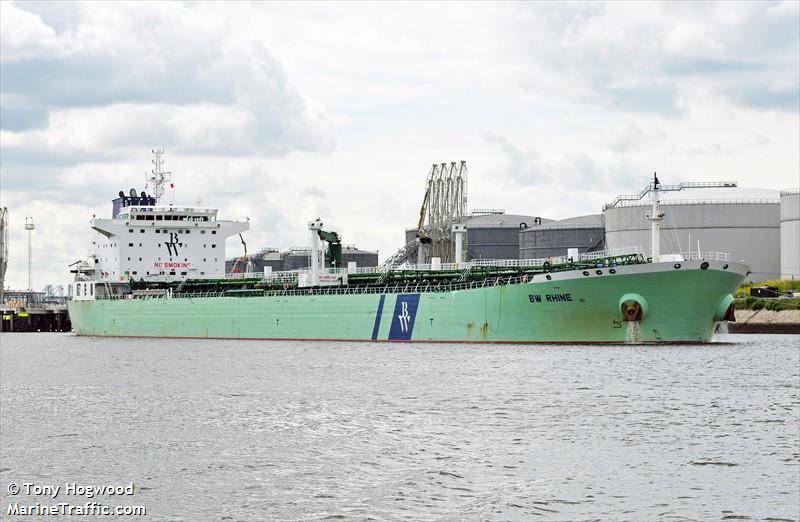U.S. Customs Revenue Tops $100 Billion for First Time Amid Tariff Surge
US revenue from customs duties this fiscal year surpassed $100 billion for the first time, reflecting higher tariffs imposed by the Trump administration.

By Paul Wallace, Sharon Cho, Verity Ratcliffe and Nourhan Samra (Bloomberg) —
A ship was hit by an explosion at the Saudi Arabian port of Jeddah, as attacks in the Red Sea mount.
An “explosive-laden” boat struck a fuel tanker early on Monday morning in what was a “terrorist attack,” the official Saudi Press Agency reported, citing a spokesperson at the Ministry of Energy. There were no casualties and no disruptions to oil or fuel supplies, SPA said.
The incident came just three weeks after an oil tanker was damaged, possibly by a mine, at the Saudi terminal of Shuqaiq and Yemen’s Houthi rebels claimed a missile strike on a Saudi Aramco fuel depot in Jeddah.
While the damage was small, the event again raised questions about the region’s stability and helped push Brent crude above $50 a barrel. Tensions have risen as the U.S., a Saudi ally, ramps up sanctions on Iran, which backs the Houthis in Yemen’s civil war.
No group or country claimed responsibility for Monday’s attack.
“These acts of terrorism and vandalism, directed against vital installations, go beyond the kingdom and its vital facilities, to the security and stability of energy supplies to the world,” SPA said.
Tanker BW Rhine was struck while discharging at Jeddah at about 12:40 a.m. local time, according to a statement from its owner, Hafnia. The Singapore-flagged vessel immediately ceased transferring fuel and a fire was extinguished without any injuries to the 22 crew members, it said.
“It is possible that some oil has escaped from the vessel,” Hafnia said. “But this has not been confirmed.”
Aramco’s trading unit had chartered the ship, which loaded gasoline at the Saudi port of Yanbu on Dec. 8 before sailing south to Jeddah, according to ship-tracking data compiled by Bloomberg. Jeddah, Saudi Arabia’s second-biggest city, is about 370 miles (595 kilometers) from the Yemeni border.
“It’s an isolated incident and therefore we don’t need any significant change in mentality or activity,” Kevin Wright, an analyst at data intelligence firm Kpler, said in an interview with Dubai-based consultant Gulf Intelligence. “We will continue to see these pinpricks but they have limited impact.”
The United Kingdom Maritime Trade Operations, an organization linked to the British navy, advised vessels in that part of the Red Sea to “exercise extreme caution.” Citing the Jeddah Maritime Rescue Co-ordination Centre, it said the port was shut for an unknown length of time.
A spokesman for the Saudi Ports Authority didn’t immediately respond to messages requesting comment. Iranian, Yemeni and Houthi officials haven’t commented on the attack.
Brent crude rose 0.3% to $50.14 a barrel by 2:43 p.m. in London, paring earlier gains of as much as 1.7%.
The attack was probably “intended to cause panic throughout the international shipping community and in turn impact Saudi commercial interests,” said Munro Anderson, a partner at maritime-security firm Dryad Global.
The Houthis have been fighting Yemen’s United Nations-backed government since 2014. A Saudi-led coalition intervened a year later on the side of the government.
The Shiite group has previously used mines to target ships in Saudi Arabian waters. It also claimed attacks on Aramco’s Abqaiq oil-processing plant and Khurais field in September 2019. Armed drones temporarily knocked out about half of Saudi Arabia’s oil-production capacity and briefly caused crude prices to soar.
The UN concluded those missiles probably came from Iran.
(An earlier version of this story was corrected to remove a reference to bunker fuel powering aircraft.)(Updates with Saudi government comments.)
–With assistance from Anthony Di Paola and Golnar Motevalli.
© 2020 Bloomberg L.P.

Sign up for gCaptain’s newsletter and never miss an update

Subscribe to gCaptain Daily and stay informed with the latest global maritime and offshore news


Stay informed with the latest maritime and offshore news, delivered daily straight to your inbox
Essential news coupled with the finest maritime content sourced from across the globe.
Sign Up